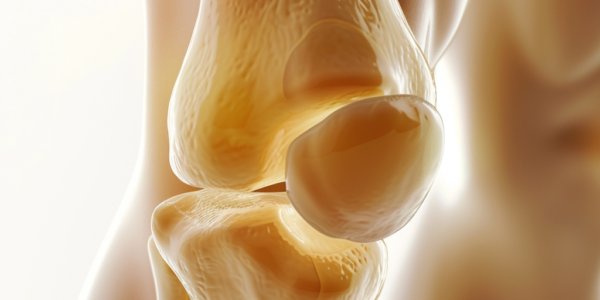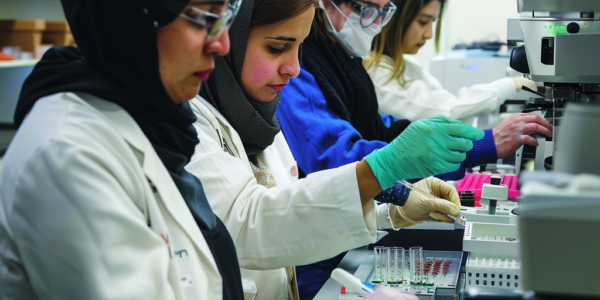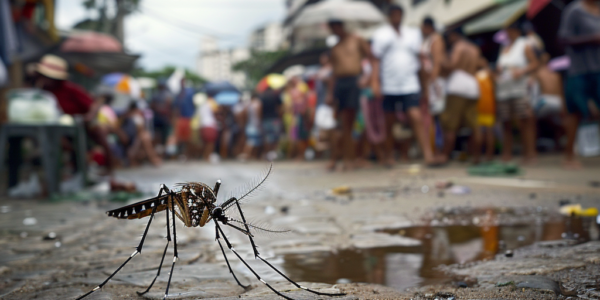New Study Offers Hope for Cartilage Regeneration in Arthritic Mice
New study offers hope for potential alternative treatment for osteoarthritis. Researchers identify new type of stem cell with potential for knee cartilage regeneration in arthritic mice. Findings pave way for potential development of cartilage replacement therapy for OA patients.
TikTok users report spread of ‘mystery virus’
TikTok users have been reporting the spread of a ‘mystery virus’ causing concern among young people. Despite testing negative for COVID-19, RSV, and the flu, users are experiencing symptoms such as nausea, excess mucus, and feeling faint. The reports have sparked discussions and speculations on social media, particularly on TikTok, where users have been sharing their experiences and seeking answers. Health experts have been urging caution and advising individuals to seek medical attention if they experience any concerning symptoms. The emergence of this ‘mystery virus’ has raised awareness about the importance of staying informed and taking appropriate health precautions.
2024 Clinical Practice Guideline on Salvage Therapy for Prostate Cancer Released by AUA, ASTRO, and SUO
The 2024 clinical practice guideline on salvage therapy for prostate cancer has been released by the American Urological Association (AUA), in partnership with the American Society for Radiation Oncology (ASTRO) and the Society of Urologic Oncology (SUO). The guideline emphasizes the importance of balancing undertreatment with overtreatment, utilizing new therapeutic agents and imaging modalities, and optimizing patient selection with evidence-driven prognostic markers to improve oncologic outcomes and maintain the quality of life for these patients.
New Studies Explore the Link Between Attention and Eye Movements
Two new studies from the Centre for Neuroscience, Indian Institute of Science, uncover the close link between attention and eye movements, revealing how the brain coordinates these processes. The studies show that pre-saccadic attention may not always be beneficial and provide insights into the relationship between attention and the detection of changes in the visual environment.
First DNA study of ancient Eastern Arabia reveals resistance to malaria
The first DNA study of the ancient population of Eastern Arabia has revealed that people developed resistance to malaria following the appearance of agriculture in the region around five thousand years ago. The study also provides unprecedented insights into human history and disease progression in the region, shedding light on the ancestry of ancient populations and the prevalence of the malaria-protective G6PD Mediterranean mutation. The research, published in Cell Genomics, involved experts from multiple universities and research centers.
Raising Concerns About Colorectal Cancer Screening Rates in Canada
March is Colorectal Cancer Awareness Month, and CCRAN is raising concerns about inadequate screening rates in Canada. Despite being the second leading cause of cancer-related deaths, 9 out of 10 cases of colorectal cancer can be prevented through screening. CCRAN urges the government, healthcare practitioners, and individuals to take action to improve screening uptake, especially for early-age onset colorectal cancer cases. Join CCRAN in its efforts to combat colorectal cancer not only in March but throughout the year.
Researchers Develop First Synthetic Molecular Motor ‘The Lawnmower’
Researchers at Simon Fraser University and Lund University have created the first synthetic molecular motor, ‘The Lawnmower,’ capable of propelling itself by harnessing the energy it generates as it cuts through fields of proteins. This groundbreaking achievement has the potential to revolutionize the treatment of various diseases and opens up new possibilities in the field of synthetic biology and molecular engineering.
Pfizer’s RSV vaccine shows promising results in older adults
Pfizer’s Abrysvo vaccine has shown durable protection for older adults against respiratory syncytial virus, with consistent efficacy across two full seasons. Initial data on more than 37,000 participants indicates 77.8% effectiveness against severe illness after the second season, down from 88.9% after one season. The vaccine also demonstrated consistent efficacy against RSV A and RSV B, with no new adverse events reported after the two seasons.
Pomegranate Extract Pomanox® Shows Potential in Slowing Age-Related Frailty in Mice, Study Finds
A recent study at the University of Valencia found that Euromed’s pomegranate extract Pomanox® can slow age-related frailty in mice by preventing frailty, improving motor skills, and reducing oxidative stress in the cerebellum. The study demonstrated that Pomanox® maintained antioxidant levels in elderly mice, influenced gene expression related to healthy aging, and improved motor skills and coordination. This suggests the potential of Pomanox® to provide nutritional support for common health problems in later life.
Brazil Faces Biggest-Ever Dengue Outbreak
Brazil is facing its biggest-ever outbreak of dengue fever, with nearly 600,000 cases reported in the first few weeks of 2024 alone. The surge in cases is attributed to the combined impact of global warming and El Niño, creating favorable conditions for the Aedes aegypti mosquito, which spreads the dengue virus. Scientists had previously predicted that climate change would lead to a significant increase in dengue cases worldwide, and this is now becoming a reality. Latin America is witnessing an unprecedented level of dengue cases, with Brazil being particularly hard hit.










